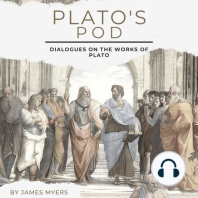111 min listen

Plato's Laws - Book X, Part 1: Universal Patterns
Plato's Laws - Book X, Part 1: Universal Patterns
ratings:
Length:
123 minutes
Released:
Feb 2, 2024
Format:
Podcast episode
Description
On January 21, 2024, Plato's Pod began its extended series on Plato's longest and perhaps most enigmatic and impenetrable dialogue, The Laws, which is said to have been his final work. Members of the Toronto, Calgary, and Chicago Philosophy Meetup groups began by discussing Book X, near the end of the dialogue, which features Plato's cosmology. The immaterial soul, says the unnamed Athenian speaking with a Cretan and Spartan, is the oldest thing in the universe, older than material physical matter and therefore the primary cause of all motion. Our discussion ranged from Plato's definition of "god" and the soul's power of persuasion, to the basis of the soul's laws. Are the laws rooted in universal nature, or in the time-bound variability of convention? Many fascinating points were raised, setting the stage for the second half of Book X in our next episode.
Released:
Feb 2, 2024
Format:
Podcast episode
Titles in the series (59)
Dialogue on The Timaeus: Creation of the Intelligent Universe by Plato's Pod: Dialogues on the works of Plato